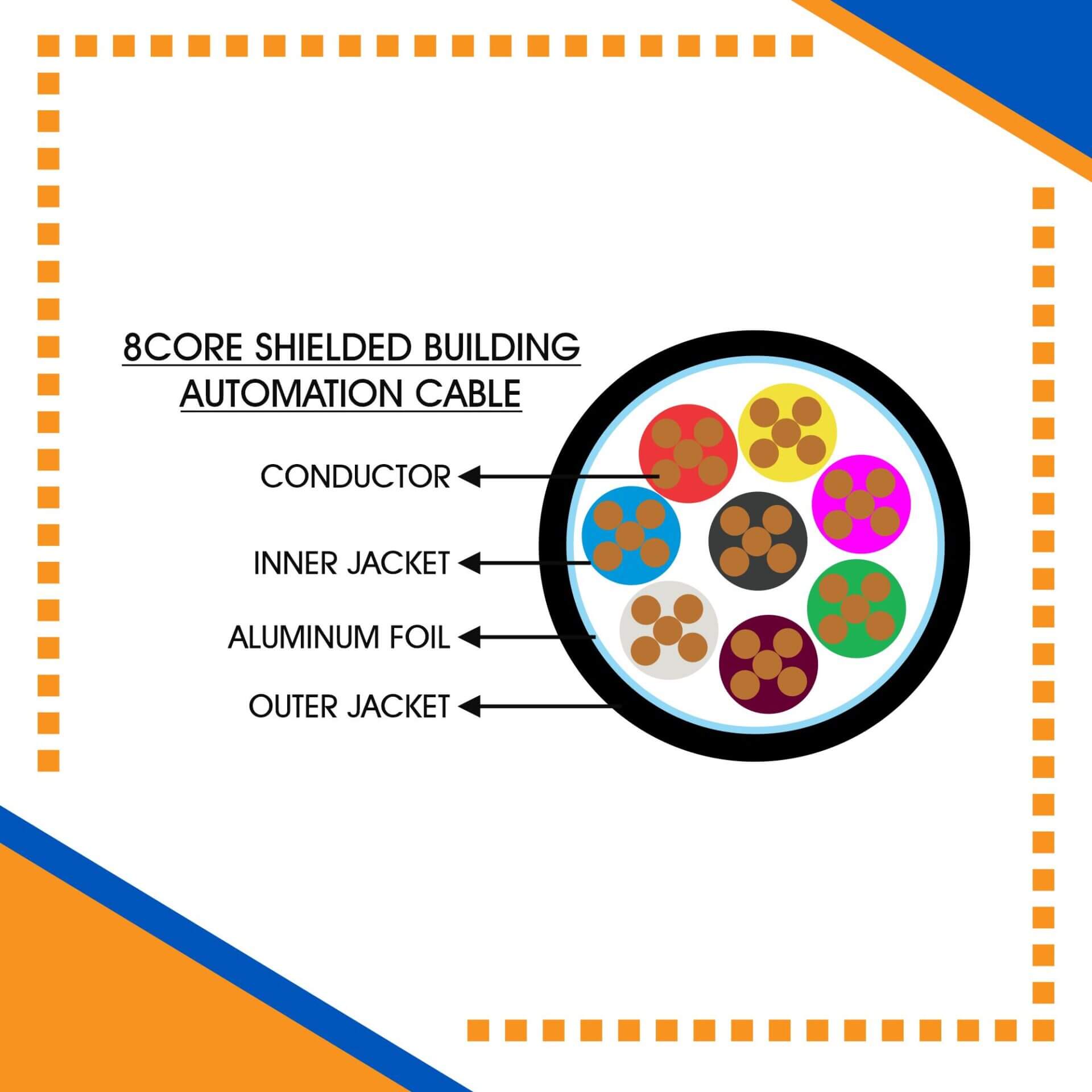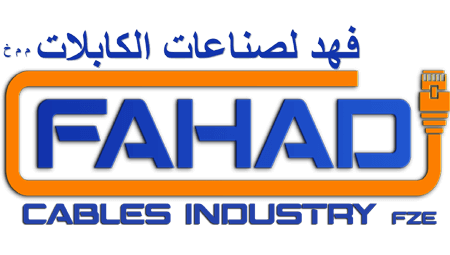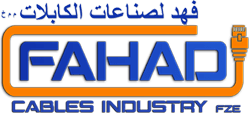- Network Cables
- Control automation Cables
- Data Patch Cord
- fiber optic cable
- Fiber Patch cord Multimode
- Fiber Patch cord Single Mode
- Fiber Pigtails Series
- Coaxial Cables
- security cable wire
- alarm cable
- speaker cables
Understanding Building Automation Cables for BMS Systems: Insights from Fahad Cables Industry FZE, Sharjah, UAE

Introduction to Building Automation Systems (BMS)
Building Automation Systems (BMS) represent a pivotal advancement in modern building management, integrating multiple functionalities aimed at enhancing efficiency, safety, and comfort within structures. These sophisticated systems orchestrate the operation of critical components such as heating, ventilation, air conditioning (HVAC), lighting, security, and energy management, thereby enabling a cohesive and automated approach to facility management.
A BMS operates as a centralized control system that intelligently manages a building’s environment. By utilizing an array of sensors and controllers, it monitors and adjusts the performance of various subsystems. For example, HVAC systems can be fine-tuned to maintain optimal temperature and humidity levels, considerably improving occupant comfort while reducing energy consumption. Meanwhile, advanced lighting control systems can automatically adjust illumination based on occupancy or natural light levels, further contributing to energy efficiency and sustainability goals.
Security is another vital component of BMS, where systems can integrate access controls, surveillance cameras, and alarm systems to create a safer environment. Building managers benefit immensely from streamlined operations, as BMS can provide real-time data and alerts, enabling informed decision-making. Additionally, energy management systems within a BMS help track energy consumption patterns, identify inefficiencies, and implement strategies for improvements, leading to significant cost savings.
The importance of building automation cannot be overstated, particularly as the demand for smarter buildings continues to grow. Utilizing an effective BMS not only enhances operational efficiency but also promotes sustainability, safety, and regulatory compliance. As we delve deeper into the specifics, understanding the role of building automation cables becomes essential, as they facilitate communication among various subsystems, ensuring optimal functionality and reliability within BMS frameworks.
The Role of Cables in BMS Systems
Building Management Systems (BMS) play a crucial role in ensuring the efficient operation of modern buildings. At the heart of these systems lies a network of cables that serve as the backbone, enabling communication and power distribution among various devices and systems. The significance of these cables cannot be understated, especially considering their role in promoting system reliability, safety, and efficiency.
In a typical BMS, different components such as sensors, controllers, and actuators need to communicate with each other to maintain optimal operational conditions. This communication is facilitated by various types of cables, each suited for specific applications. For instance, twisted pair cables are often used for data transmission, as they help reduce electromagnetic interference and enhance signal integrity. Other common types include coaxial cables and fiber optic cables, which can handle higher bandwidths and longer distances without signal degradation.
Moreover, power distribution is another critical function fulfilled by these cables. Low voltage power cables are necessary to supply energy to devices within the BMS framework. The selection of appropriate cable types is essential not only for system performance but also for compliance with industry standards and regulations. Cables must meet specific fire safety standards, environmental requirements, and durability aspects to ensure they remain functional over the long term.
Additionally, as technology advances, the requirements for data speed and reliability increase. This necessitates the use of high-performance cables designed to support emerging BMS technologies, such as smart building functionalities and IoT integrations. Proper installation and maintenance of these cables are paramount to avoid interruptions in communication and power delivery, thus ensuring seamless operation of the entire system.
The effectiveness and dependability of a BMS are significantly influenced by the quality and type of cables employed. As such, understanding the role of cables in BMS systems is vital for anyone involved in the design, implementation, or maintenance of these complex infrastructures.lighting cable size,lighting cable usb,lighting control cable,lighting to usb cable,low voltage cable lighting,macbook charging cable light,olympus light guide cable,outdoor lighting cable,usb to lighting cable,white cable fairy lights
Introduction to Fahad Cables Industry FZE
Fahad Cables Industry FZE, situated in Sharjah, UAE, has emerged as a prominent manufacturer in the building automation cables sector. Established with a commitment to innovation and quality, the company has built a solid reputation over the years, catering specifically to the growing demands of building management systems (BMS). With a comprehensive range of high-performing cables, Fahad Cables has positioned itself as a key player in the automation and electrical fields, demonstrating both technical expertise and a customer-centric approach.
The company’s history dates back to its inception when the founders recognized the potential for specialized cables in the evolving landscape of building automation. This foresight has allowed Fahad Cables to navigate the competitive landscape successfully and to expand its offerings. The commitment to manufacturing excellence is evident in every product, ensuring they meet stringent industry standards and customer specifications. As a result, Fahad Cables has developed a loyal client base, ranging from construction firms to system integrators, who rely on their products for seamless operations in BMS.
Fahad Cables’ mission revolves around being at the forefront of technology, ensuring that their products incorporate the latest advancements in materials and manufacturing processes. Their vision underscores a dedication to sustainability and innovation, aiming to produce cables that not only fulfill functional requirements but also contribute to energy efficiency in buildings. This strategic approach has earned them accolades in their industry, further solidifying their status as a leading manufacturer of building automation cables.
The commitment to quality assurance extends across all facets of the manufacturing process, from design to distribution, reflecting the company’s goal of delivering reliable and effective solutions. Fahad Cables Industry FZE continues to strive for excellence while catering to the diverse needs of the building automation industry.
Types of Building Automation Cables Manufactured by Fahad Cables
Fahad Cables Industry FZE offers a diverse range of building automation cables that cater to various applications within Building Management Systems (BMS). Among the most significant types are data cables, power cables, and hybrid cables, each tailored to meet the specific requirements of modern building automation. These products are designed with a keen focus on quality, performance, and reliability in order to ensure seamless integration into BMS solutions.
Data cables are a critical component of any BMS, providing the necessary infrastructure for communication between devices. Fahad Cables produces high-quality data cables that support various protocols essential for building automation, ensuring smooth data transmission and minimizing latency. The use of superior insulating materials enhances their durability, making them suitable for both indoor and outdoor installations.
Power cables, another key offering from Fahad Cables, are designed to deliver electrical power to BMS components effectively. These cables are engineered to handle high voltage and current, ensuring robust performance under challenging conditions. Incorporating advanced technologies, such as improved shielding and lower resistance materials, these power cables are not only efficient but also enhance the overall safety of electrical systems within buildings.
In addition to data and power cables, Fahad Cables also manufactures hybrid cables that combine the functionalities of both data and power transmission into a single cable. This innovation significantly simplifies installation processes, leading to reduced labor costs and improved organization within BMS setups. The hybrid cables are built to maintain performance integrity, ensuring that both data and power signals remain unaffected by electromagnetic interference.
What sets Fahad Cables apart from competitors is their commitment to employing cutting-edge manufacturing technologies and rigorous quality assurance protocols. By continuously adapting to industry advancements and customer needs, Fahad Cables plays a vital role in enhancing the efficiency of building automation systems.
Quality Assurance and Compliance in Manufacturing
Quality assurance in the manufacturing of building automation cables is crucial in meeting both safety and performance standards in the industry. Fahad Cables Industry FZE, located in Sharjah, UAE, has implemented robust quality control measures to ensure that all their products conform to necessary compliance standards. Adherence to regulatory compliance not only enhances the reliability of the cables but also provides customers with the confidence in the cables used in their building management systems (BMS).
To maintain high-quality manufacturing processes, Fahad Cables adheres to several recognized international standards and certifications, including ISO 9001 for quality management systems and IEC standards for electrical cables. These frameworks guide the organization in delivering products that meet or exceed customer expectations while maintaining safety protocols. The manufacturing process at Fahad Cables involves rigorous testing procedures, ensuring that each batch of building automation cables undergoes extensive quality checks before reaching the market.
The compliance with these standards signifies a commitment to product quality as well as environmental performance. With sustainable practices in focus, Fahad Cables also strives to align its production techniques with eco-friendly guidelines, reducing the environmental impact of their manufacturing operations. Each product is designed with durability and safety in mind, contributing to the overall performance and longevity of the building management systems in which they are used.
Moreover, the company’s quality assurance practices extend beyond initial production. Continuous monitoring and evaluation of both processes and end products ensure that any potential issues are identified and addressed promptly. This proactive approach not only mitigates risks associated with safety but also assures clients of consistent operational performance across their BMS solutions. Ultimately, the focus on quality assurance and compliance solidifies Fahad Cables’ position as a trusted provider in the building automation cable market.
Innovations and Technologies in Cable Manufacturing
The evolution of building automation cables has significantly benefited from advancements in manufacturing technologies and materials. At Fahad Cables Industry FZE, located in Sharjah, UAE, the commitment to innovation is evident in their approach to producing high-quality automation cables designed for Building Management Systems (BMS). One notable development is the incorporation of advanced polymer materials, which enhance the durability and flexibility of the cables. These materials not only withstand harsh environmental conditions but also significantly reduce the risk of wear and tear over time.
Furthermore, the manufacturing processes at Fahad Cables have undergone modernization, integrating techniques such as automated assembly lines and precision extrusion. This automation ensures consistency in product quality, which is crucial for applications demanding high reliability, such as BMS systems. By utilizing state-of-the-art machinery, the company can achieve tighter tolerances and improve the overall performance of their automation cables.
Moreover, innovations in wire insulation technologies play a critical role in enhancing the efficiency of building automation systems. High-temperature and low-smoke zero-halogen (LSZH) insulation materials are part of the suite of products offered by Fahad Cables, providing superior fire resistance while maintaining excellent electrical characteristics. These features are increasingly important in creating safer environments in commercial and residential buildings.
In addition to material and manufacturing advancements, Fahad Cables emphasizes sustainability. They explore eco-friendly practices, such as recycling waste materials during the production process. This not only minimizes the environmental impact but also aligns with global sustainability goals, making their automation cables a responsible choice for modern building projects.
Overall, the continuous innovations and technological enhancements in cable manufacturing at Fahad Cables Industry FZE underscore their commitment to delivering exceptional building automation solutions. These developments ensure that their automation cables meet the growing demands for high performance, safety, and environmental responsibility in the industry.
Case Studies: Successful Implementations of BMS with Fahad Cables
The implementation of Building Management Systems (BMS) has revolutionized the way buildings are automated and monitored. Fahad Cables Industry FZE, based in Sharjah, UAE, has played a key role in facilitating these systems through the provision of high-quality building automation cables. This section delves into several notable case studies that highlight the successful integration of BMS using cables produced by Fahad Cables.
One prominent case involved a large commercial complex in Dubai, where the project leaders sought to enhance energy efficiency and overall operational control. By utilizing Fahad Cables’ specialized building automation cables, the contractors were able to establish seamless communication between various system components, such as HVAC, lighting, and security systems. The result was a 30% reduction in energy consumption within the first year of implementation. Feedback from the facility management team indicated that the reliability of the cabling solutions significantly minimized downtime.
Another notable project was an educational institution in Abu Dhabi that aimed to modernize its campus infrastructure. The integration of an advanced BMS was pivotal in controlling environmental conditions in classrooms and laboratories. By incorporating Fahad’s building automation cables known for excellent signal integrity and durability, the institution was able to provide a more conducive learning environment. Testimonials from the administration praised the ease of installation and consistency in performance, which ultimately led to a smoother transition to automated systems.
Lastly, a hospitality project in the UAE further exemplified the advantages of using Fahad Cables’ products. The installation of a comprehensive BMS enabled centralized control over guest services and energy management. Hotel management reported enhanced guest satisfaction rates alongside a remarkable reduction in operational costs over time. The success of these case studies underscores the importance of investing in quality cabling solutions for effective BMS implementations in diverse sectors.
Future Trends in Building Automation Cables
The building automation cable industry is undergoing significant transformation, largely driven by advances in technology and evolving market demands. One of the most pronounced trends is the integration of the Internet of Things (IoT) into building management systems (BMS). With smart buildings becoming increasingly prevalent, the need for specialized cables that can support a multitude of connected devices has escalated. These cables must not only handle data communication but also ensure reliable power transmission for sensors, actuators, and other smart components.
Emerging technologies are reshaping the landscape of building automation cables. Innovations in materials science have led to the development of cables that offer enhanced durability and flexibility, which are crucial for complex installations. Additionally, advancements in shielding techniques are being employed to mitigate interference and improve signal integrity in environments laden with electronic noise. As a result, installers and facility managers can expect greater reliability and reduced maintenance costs, underscoring the value of high-performance cables in BMS applications.
Furthermore, there is increasing emphasis on sustainability and energy efficiency within the cable manufacturing process. As global awareness of environmental issues rises, manufacturers are striving to develop cables that adhere to eco-friendly standards. This includes utilizing recyclable materials and implementing energy-efficient production methods. The expectation is that future building automation cables will not only contribute to the efficiency of smart buildings but also minimize their ecological footprint, aligning with broader sustainability goals. In conjunction, regulatory frameworks are expected to evolve, pushing for increased transparency and performance benchmarks in the cable supply chain.
Overall, the future of building automation cables is promising, with innovations catering to the rising demands of smart technologies and sustainable practices. Stakeholders across the industry will have to adapt to these changes to remain competitive and responsive to the needs of modern buildings.
Conclusion: Choosing the Right Cables for Optimal BMS Performance
In the realm of Building Management Systems (BMS), the selection of appropriate building automation cables is paramount for optimal performance and efficiency. It has been established that these cables are integral to the seamless communication between various systems, helping in energy management, security, and the overall functionality of smart buildings. The characteristics of the cables, such as their data transmission speed, shielding properties, and temperature resilience, ultimately influence the effectiveness of the BMS components.
Throughout this discussion, the significance of opting for high-quality cables cannot be overstated. Low-quality or incompatible wiring may lead to increased maintenance costs, system failures, and reduced longevity of the BMS. Therefore, it is advisable for stakeholders, including engineers and facility managers, to prioritize quality when selecting cables. Investing in reputable brands, such as Fahad Cables Industry FZE, ensures that your systems are supported by cutting-edge technology and innovative designs that meet stringent operational standards.
Furthermore, understanding the specific requirements of a BMS is essential before making any procurement decision. This involves analyzing the environment where the cables will be installed, the data load they will carry, and the potential electromagnetic interference they might encounter. By carefully evaluating these factors, one can ascertain which types of building automation cables are most suitable for their needs—be it twisted pair cables, coaxial cables, or fiber optics.
In conclusion, the right building automation cables contribute significantly to the efficient operation of BMS systems, enhancing overall performance and reliability. Embracing quality and innovation in cable selection will pave the way for successful building automation, ultimately leading to a more intelligent and responsive infrastructure.

